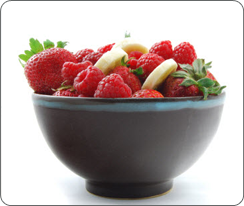Feed Your Friends!
Chances are, you’ve more than likely heard about probiotics, which are now widely advertised online, as well as on TV and radio. These are the “friendly” or “helpful” bacteria that are naturally present inside of your body and which contribute to your wellness in many different ways. Popular culture is finally becoming aware of the fact that encouraging healthy intestinal bacteria is one way to support good digestive and immune health.
What are prebiotics?
But how much thought have you given to the fact that these billions of “little friends” playing house in your body are alive? That’s right! Among other things, this means that they need to eat. Of course, the microorganisms in your body are fed a diet directly resulting from your daily meals; whatever you swallow, they get a dose of it. All the same, not all food and drink sources are equally beneficial to friendly bacteria, and some may actually encourage unfriendly bacterial growth.
Enter prebiotics. While intimately related to probiotics, the two are not the same.
Probiotics are the actual microorganisms that inhabit your body, and prebiotics are the food that probiotics eat.
(How about one more term? When prebiotics and probiotics are put together – as they often are in supplement formulas – they are collectively termed synbiotics. Yogurt is an example of a synbiotic, though you probably won’t see that word on the label!)
What foods contain prebiotics?
 Bananas and berries contain prebiotics.
Bananas and berries contain prebiotics.
- whole grains
- bananas
- berries
- tomatoes
- onions
- garlic
- honey
- artichokes
- legumes
Alternately, when they are provided as part of a probiotic supplement, prebiotics are listed based on their active compounds (rather than by the foods they come from) such as inulin-type fructans, galactooligosaccharides (GOS), beta-glucans, and fructooligosaccharides (FOS).
What do prebiotics do?
Whether you get them from your food or via supplementation, prebiotics are important as they help the friendly bacteria in your body to thrive. Indeed, according to one source, “a plethora of studies indicate that prebiotics can help to replenish useful bacteria to the colon and restore youthful balance to the gut ecology.”
As they positively affect friendly intestinal bacteria, prebiotics play a role in the body’s uptake and usage of some nutrients, such as calcium and iron.
Look for prebiotics in your probiotic supplement.
As many people eat less than the recommended daily servings of fruits, vegetables, whole grains, and legumes – foods which contain naturally-occurring prebiotics – it makes sense to consider a probiotic supplement that contains a prebiotic element. This will ensure that as probiotics are delivered to the body, they have the fuel they need to multiply and effectively “take up residence” in the intestines. In effect, this increases the number of friendly bacteria in the body while creating a balance against the unfriendly bacteria. It’s a win-win!
So, when looking for a probiotic supplement, beyond finding one that delivers several different strains of beneficial bacteria, you should also look for one that includes a prebiotic. After all, well-fed friendly intestinal “tenants” will treat you better than those that risk being overrun by unhealthy, unfriendly competitors because they were ill-prepared to begin with.
1 Functional Foods Fact Sheet: Probiotics and Prebiotics, International Food Information Council Foundation, 2009, Retrieved November 3, 2011 from http://www.foodinsight.org/Resources/Detail.aspx?topic=Functional_Foods_Fact_Sheet_Probiotics_and_Prebiotics
2 Goepp, J. (2009). Cutting-edge colon support: Boost your immunity with prebiotics. Life Extension Magazine, Retrieved October 4, 2011 from http://www.lef.org/magazine/mag2009/dec2009_Prebiotics-Cutting-Edge-Colon-Support_01.htm
3 Campbell, K. (n.d.). Bugs in the bowel. Healthy Way Magazine, Retrieved April 30, 2011 from http://www.healthywaymagazine.com/issue30/06_bugs_in_bowel.html
4 Zeratsky, K. (2011). Is it important to include probiotics and prebiotics in a healthy diet? Mayo Foundation for Medical Education and Research (MFMER). Retrieved October 4, 2011 from http://www.mayoclinic.com/print/probiotics/AN00389/METHOD=print
5 Roberfroid, M. B. (2007). Inulin-type fructans: Functional food ingredients. Journal of Nutrition, 137. Retrieved October 4, 2011 from http://jn.nutrition.org/content/137/11/2493S.short

